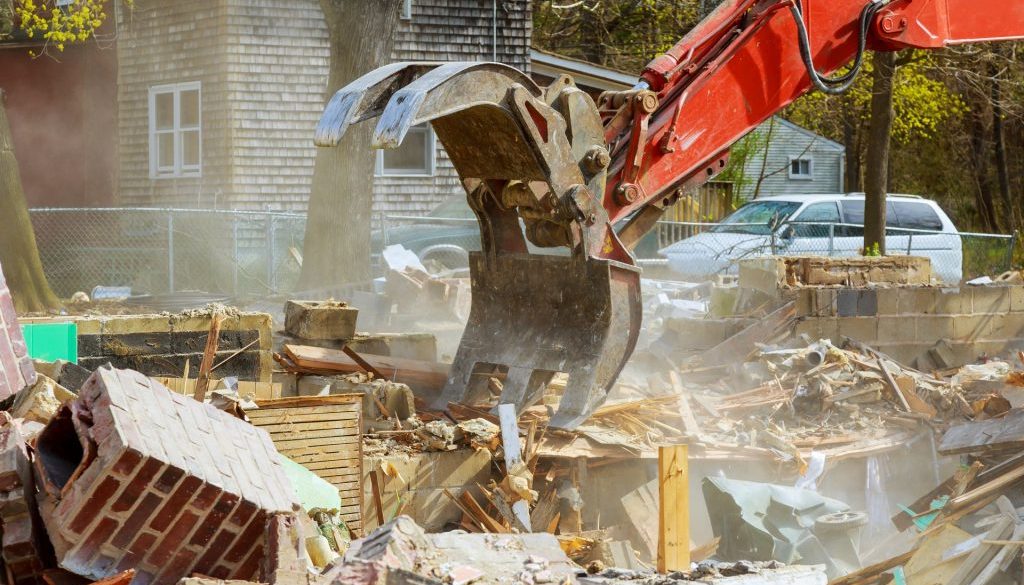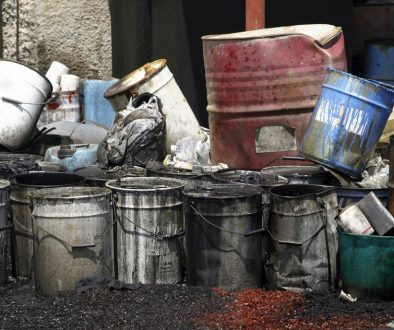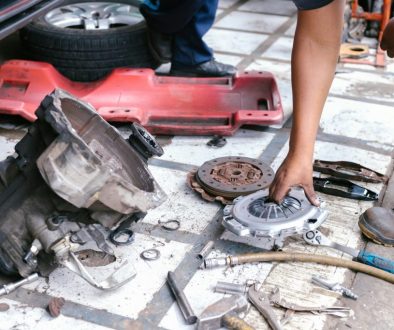As the construction industry evolves towards more sustainable and environmentally responsible practices, so must the way we approach demolition projects. Sustainable demolition involves managing waste efficiently and adopting responsible waste disposal methods that minimise environmental impact. More and more construction businesses are prioritising eco-friendly practices, and as a family-run skip hire and aggregate company servicing Staffordshire, we recognise the importance of sustainability in the industry.
Traditional demolition methods can generate a significant amount of waste, including valuable materials that could be potentially recovered, recycled, or repurposed. Sustainable demolition takes a circular economy approach, aiming to maximise the value of materials and minimise waste through recycling, reusing, and responsible disposal. The concept emphasises not just the reduction of waste but also the recovery and utilisation of valuable resources, allowing for a more sustainable and responsible construction industry.
Join us on this journey towards sustainability as we uncover best practices and innovative approaches to responsible waste disposal in demolition, driving positive change and fostering a more environmentally friendly construction sector.
1. Adopting a Circular Economy Mindset
Embracing the concept of a circular economy is crucial to achieving sustainable demolition. This holistic approach requires viewing waste materials as resources that can be recovered and reintegrated into the construction process, rather than merely discarding them. Key principles of a circular economy mindset include:
– Prioritising waste prevention: Planning and executing demolition projects with waste minimisation in mind helps reduce the generation of waste materials right from the start.
– Maximising resource recovery: Instead of viewing demolition waste as an inevitable by-product, identify and salvage valuable materials that can be recycled, repurposed, or reused.
– Reducing the demand for raw materials: By recovering and reusing waste materials, the construction industry can decrease its reliance on virgin resources and reduce the environmental impact associated with extracting and processing raw materials.
2. Recycling and Reusing Construction Materials
A significant portion of demolition waste can be recycled or reused, providing substantial environmental and economic benefits. Let’s explore some common construction materials that can be sustainably managed during demolition projects:
– Concrete and bricks: These materials can often be crushed and used as aggregates for new construction projects, reducing the demand for natural resources and minimising waste.
– Wood: Depending on its condition, wood waste can be reused in different applications or processed into wood chips for use in landscaping or biomass fuel.
– Metals: Metals such as steel and aluminium can be efficiently recycled and reprocessed into new construction materials, significantly reducing the energy consumption and environmental impact associated with virgin metal production.
– Plastics: While not all plastic waste is easily recyclable, selecting plastic materials that are easily processed and recycled can help minimise waste and improve overall sustainability.
3. Managing Hazardous Waste Disposal Responsibly
Hazardous waste is a common occurrence in demolition projects and must be managed responsibly to protect human health and the environment. Some examples of hazardous waste materials found in demolition projects include asbestos, lead-based paint, and contaminated soil. Here are some steps to ensure responsible hazardous waste disposal:
– Proper identification: Accurately identify hazardous materials within the demolition project and take appropriate precautions to protect workers and the public.
– Segregation and containment: Separate hazardous waste materials from non-hazardous waste to prevent cross-contamination and ensure proper disposal methods for each type of waste.
– Engaging licensed specialists: Contract with licensed hazardous waste handlers and disposal facilities to ensure the safe handling, transport, and disposal of hazardous materials in compliance with legal requirements.
4. The Role of Aggregates in Sustainable Demolition
Aggregates play an essential role in sustainable demolition, providing a valuable resource for new construction projects and diverting waste materials away from landfills. They can be sourced from various construction materials such as concrete, bricks, and asphalt and can be employed in various applications, including road construction, building foundations, and landscaping. The use of recycled aggregates offers several benefits:
– Environmental conservation: By utilising recycled aggregates, construction projects can reduce their demand for natural resources and minimise the environmental impact of resource extraction.
– Waste reduction: Repurposing demolition waste into aggregates decreases the amount of waste sent to landfills, contributing to a more sustainable waste management system.
– Cost savings: Recycled aggregates are often more cost-effective than virgin materials, providing an economic incentive for construction projects to adopt sustainable demolition practices.
5. Implementing Deconstruction Techniques for Sustainable Demolition
Deconstruction is an innovative approach that goes beyond traditional demolition by carefully dismantling structures to preserve materials for reuse. Unlike demolition, which often results in large quantities of mixed waste, deconstruction prioritises the selective removal of components, allowing for a higher rate of material recovery. Here’s how deconstruction can be integrated into sustainable demolition practices:
– Selective Dismantling: Deconstruction involves the systematic removal of valuable components, such as doors, windows, and fixtures, which can be reused or repurposed in new construction projects. This method minimises waste and maximises the potential for material recovery.
– Material Inventory and Assessment: Before beginning the deconstruction process, conducting a thorough inventory and assessment of the building materials helps identify items that can be salvaged. This proactive approach ensures that valuable resources are not overlooked during the dismantling process.
– Labor-Intensive but Rewarding: While deconstruction can be more labor-intensive compared to traditional demolition, the long-term environmental and economic benefits often outweigh the initial effort. Salvaged materials can be sold, reused, or donated, reducing the need for new resources and supporting sustainable practices.
– Collaboration with Local Reuse Centers: Partnering with local reuse centers and non-profit organizations can facilitate the donation or sale of salvaged materials, promoting community engagement and reducing the environmental footprint of construction projects.
Conclusion
Sustainable demolition is an essential aspect of the contemporary construction industry, promoting responsible waste disposal and efficient resource management. By adopting a circular economy mindset, recycling and reusing construction materials, managing hazardous waste responsibly, and incorporating aggregates within construction projects, professionals can contribute to a more environmentally friendly and sustainable construction sector.
If you require support in sustainable demolition practices, hire a skip with Enviro Skip Hire. Let’s implement responsible waste disposal and resource management together, paving the way for a greener construction industry and a more sustainable future.




